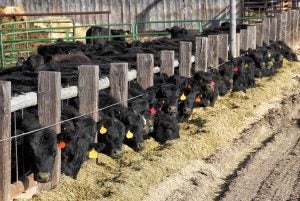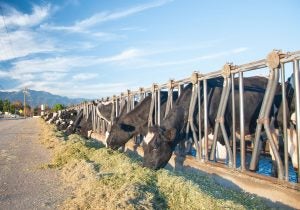An atypical case of Bovine Spongiform Encephalopathy, commonly referred to as “mad cow disease,” was detected in an approximately five-year-old or older beef cow at a slaughter plant in South Carolina.
It’s important to note that the animal never entered slaughter channels and at no time presented a risk to the food supply or human health in the United States.
And while the U.S. Department of Agriculture’s Animal and Plant Health Inspection Service’s National Veterinary Services Laboratories confirmed that the cow was positive for atypical L-type BSE, cases of mad cow disease are an extremely rare phenomenon in the United States.
This is the U.S.’ seventh detection of BSE. Six previous cases were atypical (H or L-type) BSE, while one cow, imported from Canada, tested positive for classical BSE. In most cases, the animals affected were 10 years or older. The animals were approximately five or older in two of the six detected cases.
In this case, the animal was discovered as part of a routine surveillance of cattle already deemed unsuitable for slaughter. Electronic identification tags indicate that the cow is associated with a herd in Tennessee; APHIS and veterinary officials in South Carolina and Tennessee are gathering more information throughout the ongoing investigation.
Atypical BSE generally occurs in older cattle and rarely and spontaneously arises in all cattle populations.
While the case’s announcement certainly comes as a shock, the United States has a longstanding system of interlocking safeguards against BSE that protect public and animal health in the United States.
Specific risk materials, including animal parts containing BSE, are removed from all animals presented for slaughter. Feed bans also protect cattle from the disease. In addition, ongoing BSE surveillance programs through the USDA help to detect the disease, even at very low levels in the U.S. cattle population.
The World Organization for Animal Health will continue to recognize the United States as negligible for risk for BSE as atypical cases do not impact risk status. The USDA says this is not anticipated to impact trade, though it’s not entirely certain how the nations that receive U.S. beef exports will react.

What is BSE?
Bovine spongiform encephalopathy is a neurological disease present in cattle. While chronic wasting disease affects cervids and scrapie small ruminants, all are caused by prions. Dependent on the species, prions can be transmitted from one species to another when an animal eats an infected animal or comes into contact with an infected animal’s body fluids or waste.
When cattle are affected by prion proteins associated with BSe, the brain structure of the infected bovine is affected, causing the animal to lose motor skills and eventually pass away. Cattle affected by BSE will often have behavioral changes such as weight loss, decreased milk production, behavioral changes, and issues with coordination.
Unfortunately, there is no treatment for BSE.
Classical BSE was first diagnosed in 1986 in the United Kingdom. While classical BSE spreads through ingesting certain materials from infected animals, the classical form is associated with contaminated feeds that include now-banned 9since 1997) meat or bone meal from infected animals. Other high-risk tissues were banned from animal feed by the FDA in 2009.
Atypical cases of BSE are rare and spontaneous and usually occur in older cattle. While scientists are studying what genetic or environmental factors may be at play in animals affected by BSE, what causes prions to change from normal to abnormal forms in certain animals is not fully understood.

How will BSE impact trade?
The World Organization for Animal Health recognizes the BSE risk that a country carries based on its history with the disease, enforcement of feed bans, and surveillance.
After a 2003 BSE finding, the USDA notes that many countries stopped importing U.S. beef. In a 2023 Brazilian BSE case, exports from Brazil were banned in multiple countries — after the ban, the case was confirmed as an atypical C-type BSE. The National Cattlemen’s Beef Association strong spoke out against accepting Brazilian beef imports in the U.S.
In 2015, WOAH determined that atypical BSE occurs spontaneously and that it would be excluded when determining BSE risk.
»Related: Mad cow disease detected in Brazil, ceasing exports to China


